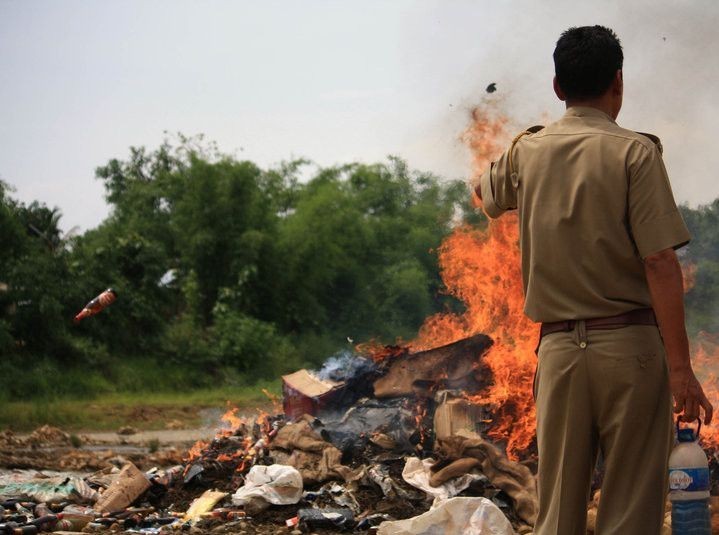BURNING ISSUE: An enforcement personnel watches over destruction of seized liquor in Nagaland. Around thirty-four years since its enactment, the Nagaland Liquor Total Prohibition Act (NLTP) 1989 continues to be a contentious issue in the State. (Morung File Photo)

Terms prohibition 'meaningless' where IMFL is easily accessible
Morung Express News
Dimapur | October 14
Civil Society Organisations (CSO) based in Dimapur has revived the call for lifting contentious Nagaland Liquor Total Prohibition (NLTP) Act in Dimapur district, atleast. The demand has been based on the ground that the 36 years old alcohol prohibition law has been a total failure, across the state, causing more harm than good.
The CSOs, under the banner of the Naga Council Dimapur (NCD), huddled on October 14, where, according to the NCD President, GK Rengma, the call for reviewing and lifting the Act in Dimapur was discussed and unanimously reiterated.
The meeting was described as a joint consultative meeting attended by Dimapur Urban Council Chairmen Federation (DUCCF), Naga Women Hoho Dimapur, Dimapur Naga Students’ Union, Gaon Bura Union Dimapur Sadar, Dimapur District Gaon Bura Association, Dimapur Chamber of Commerce of Industry, Business Association of Nagas, Dimapur District Citizens Forum, and Eastern Naga Women Organisation Dimapur.
“All the CSOs, which attended the meeting, were unanimous in their call for lifting the NLTP Act in Dimapur district,” Rengma told a press conference after the meeting. He though reminded that it was not a new demand.
The DUCCF had submitted a representation to the Nagaland Governor in December 2023 demanding repeal of the NLTP Act from Dimapur district. It was a follow up to an earlier representation submitted by Civil Society Organisations of Dimapur district to the Governor demanding the same.
“Why did we meet today to reiterate our earlier demand? It is because of the failure of the NLTP Act. What has the NLTP Act achieved since it was enacted in 1989?” said Rengma.
He said that alcohol is openly available in all the 97 recognised urban localities in Dimapur. According to him, there is no quality control, giving a free hand to bootleggers to supply adulterated alcohol, and which has had a drastic impact on health. While stating that people’s lives are being cut short, he held that drug use is also increasing.
He said that their demand is neither against the church, nor for the anticipated revenue from alcohol, but rooted in a conscious concern for the wellbeing of the citizenry.
DUCCF President, Zasivikho Zakiesato, said that the meeting charted out a roadmap for carrying forward the demand with renewed vigour. “We will be following this (meeting) up by consulting a wide range of civil society organisations as stated by the CM,” he said citing the Chief Minister’s comment in the Assembly in 2024. At the Assembly discussion on the NLTP Act, the chief Minister stressed the need for broader discussions among the civil societies.
The DUCCF had also submitted a copy of the representation it submitted to the Governor in 2023.
“We are a pressure group. We will continue to pressure the government for whatever is good for the society,” asserted Zakiesato, who is also the Convernor of the Committee for lifting the NLTP Act in Dimapur. He held that the perceived increase in drug use in Nagaland, today, has been a by-product of alcohol prohibition.
According to the DNSU, it is high time the NLTP Act is reviewed, especially in a place like Dimapur where alcohol is easily accessible. “The Act is meaningless. It seems like more and more youths are taking to drugs as a result,” said DNSU General Secretary, Michael Kath.






